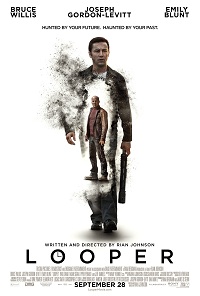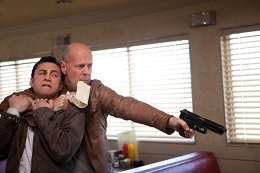 Bruce Willis plays the older version of Joseph Gordon-Levitt and the two men face off against each other in the new sci-fi movie Looper.
Bruce Willis plays the older version of Joseph Gordon-Levitt and the two men face off against each other in the new sci-fi movie Looper.
Time-travel movies can be tricky. The key to a good one is to lay down the rules of time travel quickly and then play within that sandbox while giving us a reason to care about the characters. Writer/director Rian Johnson’s film Looper does that and then some.
Joseph Gordon-Levitt is a brash and selfish hitman who kills people sent back in time from the Mafia 30 years in the future. When his older, wiser future self comes through, he doesn’t kill him (Willis), and the man wreaks havoc on the past.
Besides a challenging time-travel premise, a dark sense of humor, and some thrilling action scenes, Looper has the kind emotional weight that you wouldn’t expect. Sure, Bruce Willis plays the grizzled old veteran, but Looper gives him a rare chance to flex some serious acting muscles.
In addition, as Gordon-Levitt starts the film, you think he’s just doing a great Willis impression, but gradually he becomes a fully realized character as well. Kudos to makeup artist Kazuhiro Tsuji, who used contact lenses and prosthetics to make Joseph Gordon-Levitt appear to be a younger version of Willis. The only time it doesn’t look natural are when the eyebrows look a little too drawn in, but then again, maybe that’s just something the character does — ha!
 Johnson has all the bases covered in his time-travel sandbox, and the plot explores the bizarre opportunities one has when there are two versions of the same person in one timeline, but in Looper, it never feels like exposition. The journeys down multiple timelines, with superb supporting actors like Jeff Daniels and Paul Dano, always contain the inherent drama of the situation and play out as a natural part of the story. Because they seem organic, they’re great illustrations of the time-travel concept as well as potent foreshadowing for future scenes.
Johnson has all the bases covered in his time-travel sandbox, and the plot explores the bizarre opportunities one has when there are two versions of the same person in one timeline, but in Looper, it never feels like exposition. The journeys down multiple timelines, with superb supporting actors like Jeff Daniels and Paul Dano, always contain the inherent drama of the situation and play out as a natural part of the story. Because they seem organic, they’re great illustrations of the time-travel concept as well as potent foreshadowing for future scenes.
I’m not going to spoil the second half of Looper, where the pace slows down and the characters grapple with the moral weight of their decisions, because Johnson’s risky storytelling choices really pay off and you should experience the surprises for yourself.
Suffice it to say that after the indie high-school noir Brick (see #8), the twisty con-man adventure/romance The Brothers Bloom, and now Looper, Rian Johnson is certifiably a major talent.








{ 3 comments }
Maybe I’m crazy but I had some issues…Bruce Willis comes back to kill the rainmaker so why leave JGL in the field to live on the run knowing full well that if his younger self is hurt or killed so is he? Why not tie him up and keep him somewhere out of harms way while you check all three addresses, give yourself a head start? Absolutely hated the scene in the diner when they all shoot at Bruce rather than just kill JGL, end of chase. Despised the idea that old Bruce 30 years to the day was not prepared for Gat-Men to show up at his house in China….terrible
I think the gunmen realize this too, which is why you have that funny scene at one point when they stop working with JGL and realize they should be shooting at him as well. I can’t make excuses for why BW didn’t incapacitate JGL or why he was not prepared in China, but sometimes I feel like it’s easy to get caught in the semantics of things. The movie works emotionally and that’s what matters. I like the idea of this cycle of violence (revenge, vengeance, whatever) being broken in the middle of a time loop. It’s a great theme to hang a story on — that and the fact that different circumstances make the same person two very different people. It says a lot about what makes us human.
Well, when it comes to Old Joe not being prepared, perhaps it is because he was expecting it anyhow, and was prepared to deal with it so that his younger self could have the riches. However, that changes, once his wife was killed. Joe never seemed like the type to always think all consequences through, and though he knew he would be killed, perhaps he was hoping for some mercy on his wife, or hadn’t thought about her getting shot.
That does seem to be Old Joe’s drive. The woman who saved him, who he is willing to kill children for (and, perhaps, for some altruistic reasons so that the Rainmaker does not cause harm to others) if only to ensure she will stay alive. As it is, it’s heart breaking to see Young Joe start falling in love with Sarah, and Old Joe just repeating,”first time you saw her, first time you saw her,” (or something like that) like a litany, until he could remember.
With Joe, he acted with best intentions when a woman he fell in love with was involved.
Comments on this entry are closed.